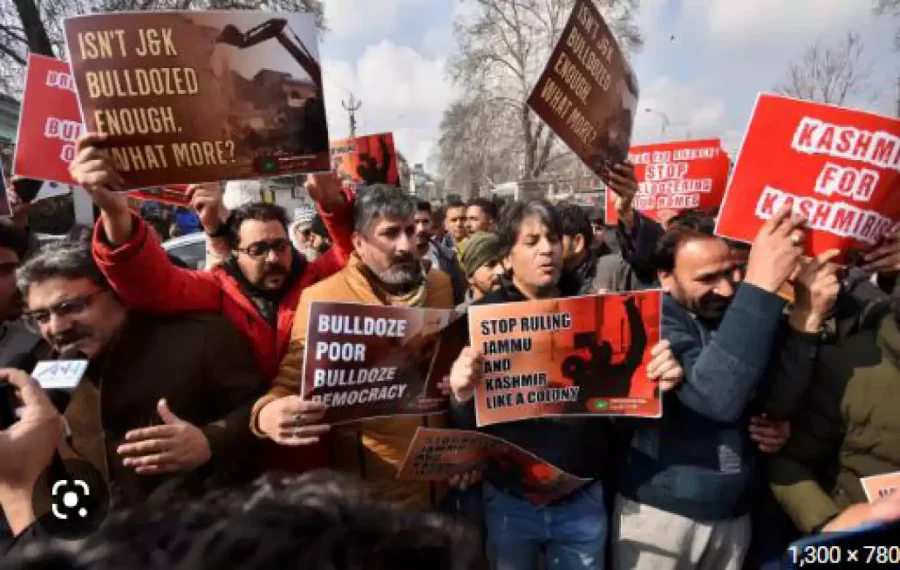Aakash Hassan in Srinagar and Hannah Ellis-Petersen in Delhi Suhail Ahmad Shah stood despairingly before the wreckage that for two decades had been his livelihood. Just hours before, he had been busy at the workshop when he heard an ominous crunch above him and the tin roof began to cave in. He barely made his escape before a bulldozer flattened the entire place.
“No notice was served to us,” said Shah, 38. “The officials came suddenly and demolished our workshop. No one is listening to us. We’ve been paying rent. Isn’t this an atrocity? They have snatched our livelihood.”
His workshop selling secondhand car parts in Srinagar, the summer capital of the beleaguered Indian state of Kashmir, was just one of dozens of structures across the region caught up in a widespread demolition drive in February. Many of these took place with little notice, even for those who had occupied the land for decades. The purpose, according to the government, was to “retrieve” state land that had been illegally encroached on. More than 50,000 acres of land were seized before the drive was paused.
But in Kashmir, the drive has been condemned as having a more sinister purpose. Many have decried it as part of a wider agenda by the Hindu nationalist government of the Bharatiya Janata Party (BJP), led by prime minister Narendra Modi, to displace and dispossess Kashmiris from their own land and shift the demographics of India’s only Muslim-majority state.
Since the Modi government came to power in 2014, bulldozers have been a popular tool for BJP leaders to target the Muslim minority in their pursuit of a religious nationalist agenda to establish India as a Hindu, rather than secular, country. In states such as Uttar Pradesh, Delhi, Gujarat and Madhya Pradesh, bulldozers have been used to crush the homes of swathes of Muslim activists accused of involvement in protests and of communities alleged to be illegal immigrants.
Panic spread in Kashmir that the BJP’s so-called “bulldozer politics” were being deployed against its Muslims. Mehbooba Mufti, former chief minister of Kashmir, termed the demolition drive “a ruse to further push people to economic margins by demolishing their homes and livelihood”.
Fayaz Ahmad, 52, whose scrapyard of 30 years was demolished without notice or warning, agreed. “This all is being done to suppress
Kashmiris,” he said. Successive governments struggled to bring the violence under control. But in August 2019 the Modi government, fulfilling a long-held promise to its rightwing base, took unilateral action against the state, stripping it of its long-held autonomy and severing it into two territories under central government control. Thousands of troops were moved into the state, the state government was dissolved, local politicians were imprisoned and the world’s longest internet shutdown, lasting 18 months, was imposed.
Since then the BJP has thrown open the doors of the state, allowing outsiders to buy property and register to vote in Kashmir for the first time. More than 2 million new voters have been registered, a source of great concern to the many who believe that the government is trying to change the demographics of the state away from its current Muslim majority.
A redrawing of the electoral map has led to accusations of gerrymandering after it became clear the reshaped constituencies would split the Muslim vote in Kashmir, to the likely electoral advantage of the BJP.
Those living in the territory say that censorship, both of ordinary citizens and the media, is standard practice by the government, police and military, and anyone expressing criticism through activism or on social media is immediately taken in by police.
While privately people in Kashmir will rail against the Modi government and speak fearfully of the future, most are too terrified to speak out publicly. “There is fear. If anyone speaks up, even on social media, they face police action. No one wants to end up in jail,” said a student who asked to remain unnamed. His friend was recently jailed under draconian security laws simply for writing a post on Facebook that had angered the police.
Journalists have become a particular target. New laws were passed to strictly control their reporting, and the few journalists who still produced critical coverage of the region have been subjected to harassment and interrogation and had their phones and laptops seized.
Journalists have been publicly thrashed by police while some have been put on no-fly lists, barring them from leaving the country. In the local newspapers, editors and owners have deleted years of coverage that was critical of the government due to the increasing pressure, and once-independent newspapers have been reduced to pamphlets for government press releases.
At least three Kashmiri journalists, Asif Sultan, Fahad Shah and Sajad Gul, have been jailed under terrorism laws. “My brother is in a very difficult situation,” said Javaid Ahmad, brother of Sajad Gul. “He has been put in a high security cell and is being treated like a dangerous criminal. He is not allowed to make phone calls home. They did not even allow him a pen and a diary.”










